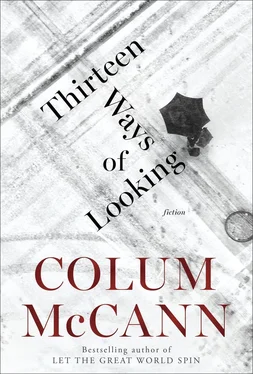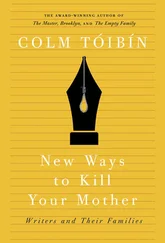As it was, it was like being set down in the best of poems, carried into a cold landscape, blindfolded, turned around, unblindfolded, forced, then, to invent new ways of seeing.
It could have been, too, that had the camera angles in the restaurant been tilted in another direction, they might have seen Pedro Jiménez come in through the door, with sprinkles of snow on his shoulders, his hat whisked off and folded into his pocket, the jacket hung on a metal hook near the door. In that instance they might have seen Pedro return to the jacket just seconds later and tuck it under several dry coats in order to hide the wetness of his own. He could also have been seen shoving the baseball cap farther into the pocket. It might have been possible to catch him, just before he turned the corner toward the bathroom, stopping and putting the heels of his hands to his anguished face and pulling his skin tight, shaking his head quickly from side to side, as if to disperse the past few minutes from his life before he went back to his dishwashing station. Another angle might have shown the terror on his face, later in the afternoon, as specifics emerged from the chef, the manager, the waitresses, and the cops together huddled in the kitchen while he washed the pan that had grilled Mendelssohn’s salmon. It might have shown the glances that went between him and Dandinho when the cops pulled Pedro aside for questioning, or the look on Dandinho’s face by the front door, or the backglances both men gave when they left the restaurant late in the evening, checking out the angles of the camera by the front foyer at a time when the cops had already downloaded the footage for examination.
None of this was yet apparent: the homicide, like the poem, had to open itself to whatever might still be discovered.
The cops could have downloaded the footage from the subway station that night where the two men stood, sullen, waiting for the 4 train to take them home to Brooklyn. But who could have intuited what their silence meant? Who could have foretold what Dandinho might say to Pedro? Who could have guessed that they might have struck a pact together? Who could have interpreted Pedro’s face as he got off the F train in Coney Island almost two hours later and pushed his way through the silver turnstile? Who could have understood his terror as he passed by the bodega on Tenth Street? Who could have known what thoughts rifled through him as he paused on the corner of Coney Island Avenue, then turned south toward the water? Even if we had access to the cameras that are peppered along the boardwalk, who could properly say that the man stuffing the puffy jacket and baseball cap in the garbage can was truly guilty? What can be seen from the manner in which he looks at the discarded clothes that nobody will ever find? What can be learned from the manner he walks away? What can be intuited from the way he gazes out to sea? What country lies out there? What past? Who is to know how much failure is still trembling through his fist?
Or maybe this is not the case at all. Maybe he is triumphant. Maybe he is raw with joy. Maybe he feels strong and justified. Perhaps he did this to avenge his daughter and her children, their poverty, their sadness, their loss of their father, the sins of their mother. Perhaps there is something entirely congratulatory in the way he walks back down the boardwalk, past the carnival grounds, under the twinkling lights. Perhaps he feels that he should do the same with the son of the man he killed. Perhaps he is thinking, Fuck you, Elliot Mendelssohn, you’re next.
It is happening, as the poet says, and it is going to happen.
Pedro will be arrested six days later. He will be charged. He will plead not guilty. His daughter will make bail for him. The State will offer. Pedro will not take it. The State says it will go all-out: second-degree murder. Pedro’s lawyer will say he should take a lesser charge, manslaughter perhaps, but Pedro will say no, he is too old for jail, he would rather fight it. He will go to trial almost a full year later. It will be up to a jury to decide. In a high-ceilinged room on Centre Street in lower Manhattan they will weigh it all up. Sift through the evidence. Disregard. Reinstate. A form of excavation and rebuilding. They will look for the one moment of revelation that might eventually turn to truth.
There will be doctors and paramedics and cardiologists and blunt-trauma experts, one who will say that Mendelssohn was killed by the punch, another who will say that he died when his head hit the ground. There will be two forensic video analysts who will ask for the courtroom curtains to be drawn. They will carefully analyze the footage for the jury using six flat screens: one for the judge, one for the prosecution, one for the defense, three for the jury. They will discuss compression, resolution, blurring, time stamps, frame rates, comparative analysis. They will show the angle of the fall. They will point out the brief appearance of the assailant. They will crop in and zoom out. They will focus on the cap and the jacket. They will argue about unique characteristics, the known and the unknown. They will not be able to show a recognizable face. They will, however, show the footage of the kitchen argument of Dandinho and Pedro. They will count through the minutes and seconds of Pedro’s bathroom visit. They will show Pedro returning to the giant sinks beneath the Brooklyn Cyclones poster. They will freeze him there a moment, plunging his hands into warm water.
Are those hands cold? Are those hands tormented? Are those hands simply doing their chores?
The prosecution will call on Elliot Mendelssohn to testify. He will tighten his jacket and stride to the front of the courtroom, then slide into the witness box. He will try earnestness, rage, prolonged silence, even tears, but the judge will cut him short. His voice will crack on cross-examination. He will say he never met the accused in his life. He will showcase his habit of raising his forefinger when answering a question. A little tremble will animate his neck. He will say that the death of his father has left him bereft. He will look at his hands as if to check that what he just said was correct. He will say that he will never recover from the shock. He will plead and cajole. He will glance once at Pedro, then quickly away. He will step down from the dock with two ovals of sweat appearing even through the cloth of his jacket. At the rear of the Centre Street courtroom he will look at his cell phone as if the answers to all the questions can be found there.
The days will go on.
They will call on the restaurant manager, Christopher Eagleton, and the waitress, Rosita Oosterhausen. Rosita’s testimony will be curt and polite. She will say that she helped Mendelssohn into his coat at the door. She will say that he was a sweet old man, and she has no idea who would choose to hurt him, or why. She will say that the trauma made her give up her job. She will say that she never saw such a pointless death. She will step down from the witness stand, furtive, coiled, as if embarrassed by her testimony. She will flick a quick look at Pedro, though he will not return her glance. Christopher Eagleton will appear nervous, as if anything he might say will affect the business of his restaurant. He will loosen his tie and say that he is very sorry for the loss of his favorite customer and he really has no clue why the attack might have occurred. He was present in the restaurant, yes, and he heard a commotion outside. He ran out to help, but did not see the assailant, or even the shape of the assailant, and really there was little more that he could say. He bent down to Mendelssohn, who appeared already dead. It all seemed entirely senseless to him. Certainly he never heard Pedro say an errant word about anyone, least of all Mendelssohn. He will leave the witness stand, head bowed, fists thrust into his jacket pockets.
Читать дальше












